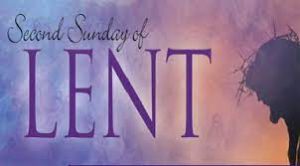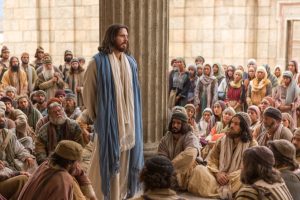 Tomorrow has been known as “Low Sunday” – a lesser Easter celebration – or “Quasi-modo Sunday” from the first two words of the Entrance antiphon at Mass: “Like newborn infants” (speaking especially about those baptized at Easter). It is the day that the newly baptized officially put away their white robes. Hence, it is known liturgically as the “Sunday of putting away the albs.” And yes, the name of this feast is the origin of the name of the hunchback, Quasimodo, in Victor Hugo’s “The Hunchback of Notre Dame.” The foundling was so named because he was discovered at the cathedral on the second Sunday of Easter.
Tomorrow has been known as “Low Sunday” – a lesser Easter celebration – or “Quasi-modo Sunday” from the first two words of the Entrance antiphon at Mass: “Like newborn infants” (speaking especially about those baptized at Easter). It is the day that the newly baptized officially put away their white robes. Hence, it is known liturgically as the “Sunday of putting away the albs.” And yes, the name of this feast is the origin of the name of the hunchback, Quasimodo, in Victor Hugo’s “The Hunchback of Notre Dame.” The foundling was so named because he was discovered at the cathedral on the second Sunday of Easter.
On that Second Sunday of Easter in the Jubilee Year 2000, at the Mass for the canonization of St. Faustina Kowalska, Pope John Paul II made a surprising announcement. “It is important that we accept the whole message that comes to us from the word of God on this Second Sunday of Easter, which from now on throughout the Church, will be called ‘Divine Mercy Sunday.” Clearly it is not a new feast but neither is it an optional title for this solemnity; rather, Divine Mercy is the integral name for this Feast Day.
The Gospel begins with the risen Christ appearing to the apostles on Easter night. Jesus calms his disciples by saying and giving them “Peace.” He shows them the scars of his Passion, his wounded hands and side, the evidence of his saving work through his suffering, death and resurrection. Then he breathes on them and explains what the divine breathing means with the words, “Receive the Holy Spirit. Whose sins you forgive are forgiven, whose sins you retain are retained.” He gives to the apostles, from the treasury of divine mercy, the power of mercy for penitents and the assurance there is nothing to fear.
The story of St. Faustina reveals the inspiration behind the Divine Mercy devotion. On February 22, 1931, at the age of 26, Sister Faustina experienced a life-changing vision of Christ. She saw him wearing a white robe and raising his right hand in blessing with his left hand resting on his heart from which flowed two rays of light. Jesus told her, “Paint an image according to the pattern you see, with the prayer, Jesus, I trust in you.” Faustina could not paint but eventually she persuaded her spiritual director to find an artist to create the painting that was named The Divine Mercy.
Thankfully there is a trend among media services to make an effort to balance stories of horror and tragedy with illustrations of mercy. For many people there are two stories that continue to stand out – The first is that of an Amish community that walked to the home of the man who had killed 5 of their children to tell his widow they forgave her husband for what he had done, and consoled her for the loss of her spouse. They buried their anger before they buried their children.
The other well-known story of forgiveness, you may recall, was depicted on the cover of TIME magazine 1984. It pictured a prison cell where two men sat on metal folding chairs. The young man wore a black turtleneck sweater, blue jeans and white running shoes. The older man was dressed in a white robe and had a white skullcap on his head. They sat facing one another, up close and personal. They spoke quietly so as to keep others from hearing the conversation. The young man was an attempted assassin; the older man was Pope John Paul II, his intended victim. At the end of their 20-minute meeting, Ali raised the pope’s hand to his forehead as a sign of respect. John Paul shook Ali’s hand tenderly.
John Paul II and the Amish Christians teach us that forgiveness is central. They believe in a real sense that God’s forgiveness depends on their extending forgiveness to other people. That’s what the mercy of God is all about. They are but two examples of God’s divine mercy in action, the same divine mercy whose message St. Faustina witnessed, the gift of mercy we celebrate on Divine Mercy Sunday. This is also a good week for our prayer intention for vocations, formators and those they guide and mentor. May God, in wisdom and mercy, see fit to bless us with the grace to persevere in our own vocations, and for insight and fortitude for all those involved in the ministry of religious formation.
~Reflection by Sister Roberta Bailey, OSB










